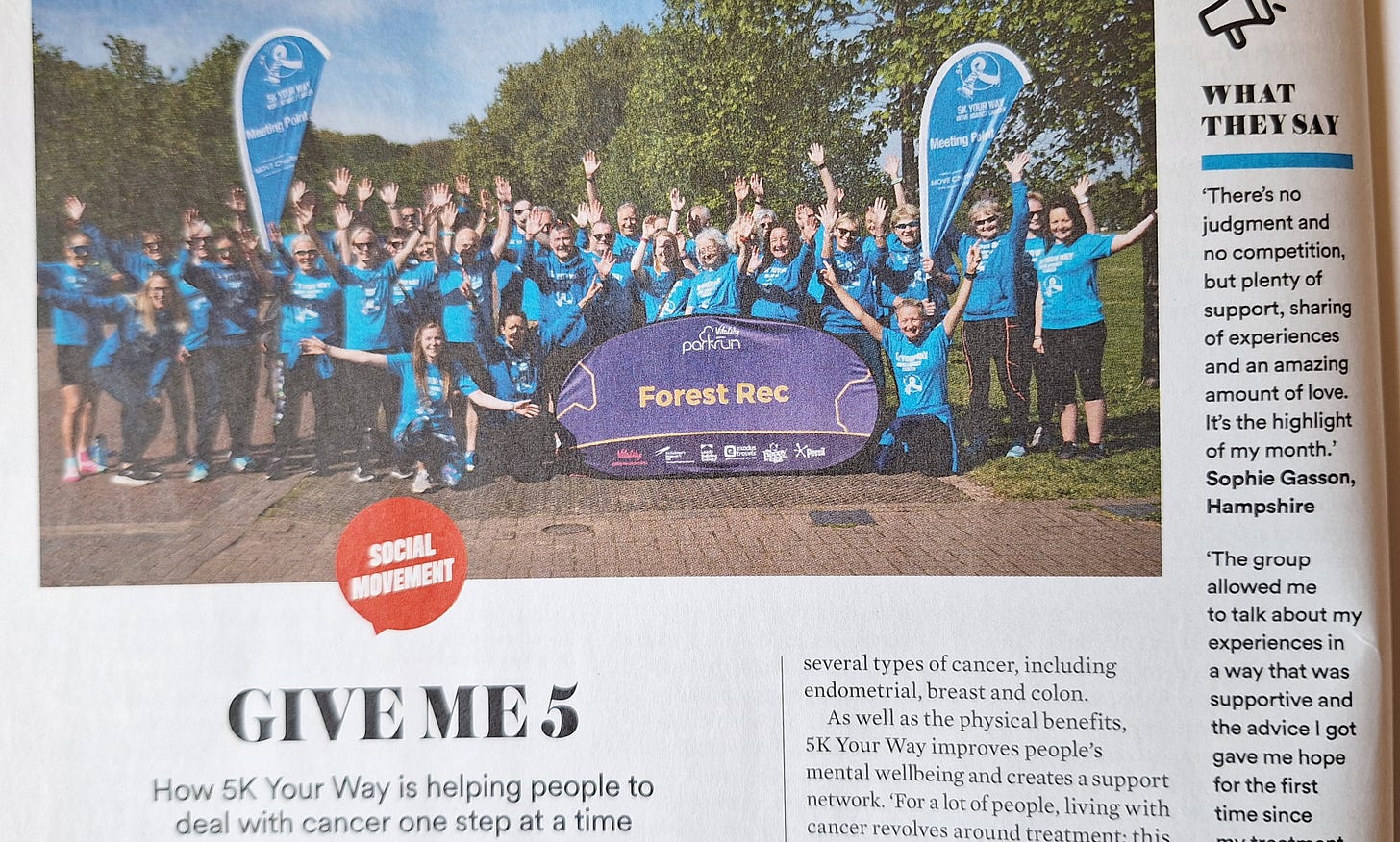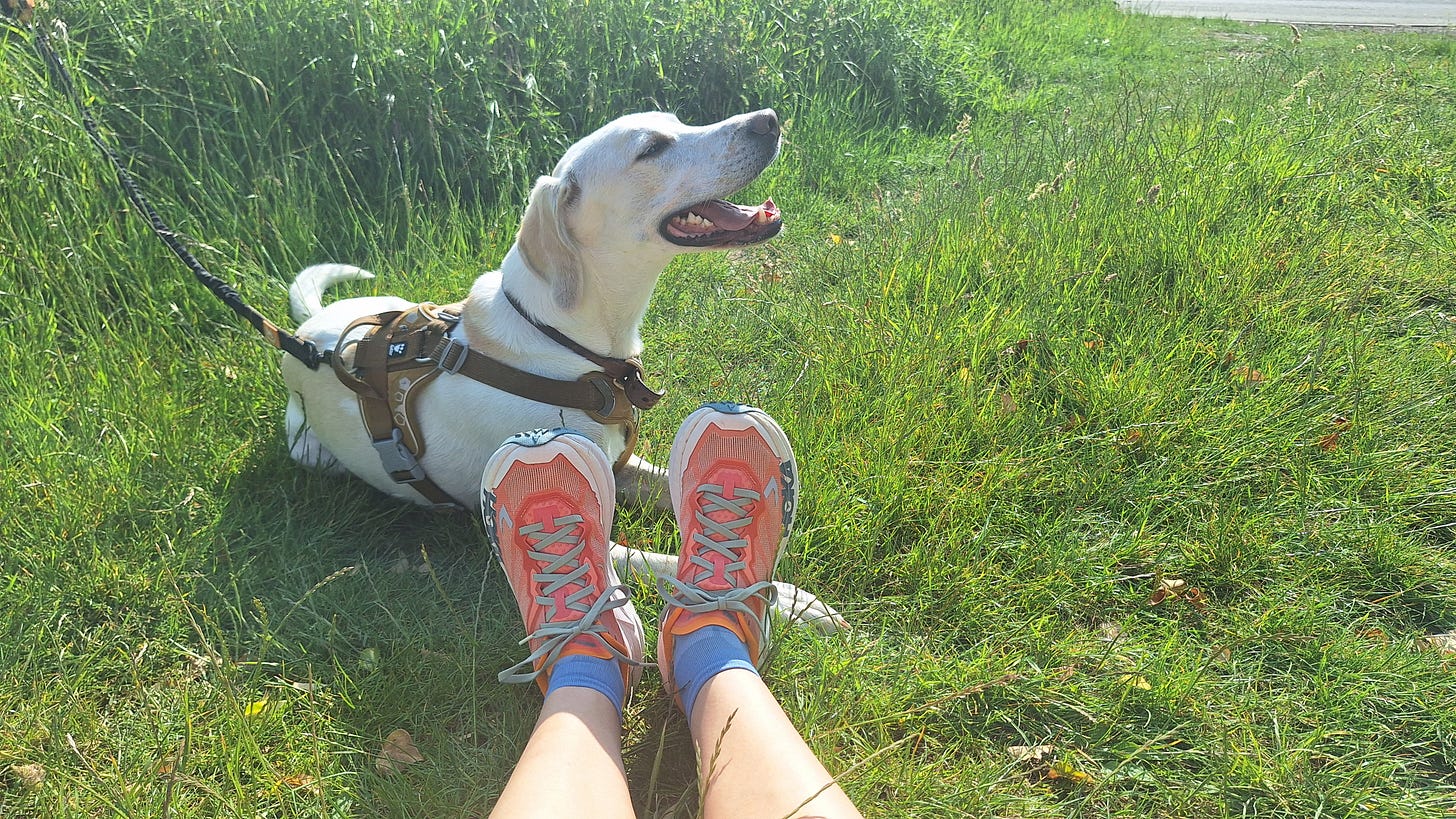The power of exercise in cancer care
Promising research highlighted by Spine winner Lucy Gossage
A couple of years ago I wrote a piece for Runner’s World social movement section about the running club 5K Your Way, Move Against Cancer.
It was co-founded by former professional triathlete and oncologist Lucy Gossage who recently transitioned into ultra running (and won the Winter Spine Race in January).
It is a running group for those affected by cancer – both patients, family, friends and the bereaved – formed on the idea that exercise is essential for positive physical and mental health whatever your body or mind is going through.
This week Lucy posted on her blog about a longitudinal study on bowel cancer patients that looked at the impact of exercise.
Lucy has always been a huge advocate of exercise during cancer treatment but has met with a lot of opposition. The prevailing medical view has always been that people with cancer will not want to exercise and they would be better off resting anyway.
“Some assume my background as a professional triathlete clouds my judgement. But after seven years I’ve witnessed first-hand how movement can empower people physically, mentally, and emotionally. Yet most people joining a group tell me no healthcare professional has ever encouraged them to exercise,” Lucy wrote in her blog.
But evidence to the contrary is mounting. Exercise during and after cancer treatment can reduce fatigue, boost mood and improve quality of life.
And finally there is a landmark study which links lower recurrence of cancer and better survival rates with exercise.
The research was conducted over a 15-year period on 889 people who had completed chemotherapy after surgery for bowel cancer. The patients were given either a three-year exercise programme with the support of a personal trainer or a set of health educational materials promoting exercise and nutrition.
“The results were astounding,” said Lucy.
The risk of cancer recurrence or new cancer was 28 percent lower in the group with the exercise programme. And after eight years the risk of dying from any cause was 37 percent lower in the same group.
“These benefits are huge. They’re of an equivalent magnitude to many of the drugs that we prescribe, many of which have horrible short and long-term side effects and are expensive. For the first time ever, we now have definitive proof that we should be prescribing exercise, alongside our prescriptions for drugs and radiotherapy. Exercise isn’t just about feeling better. It’s about living longer,” said Lucy.
Given the strength of evidence Lucy now feels validated that exercise must become part of a cancer treatment plan.
“That doesn’t mean running a marathon or cycling up mountains. It means tailored, achievable movement. Walking, cycling, roller skating, dancing. Movement that fits into someone’s life and works for them,” she said.
In the trial, the increased activity in the exercise group compared with the control group was the equivalent of 45 to 60 minutes of brisk walking or 25 to 30 minutes of jogging, three to four times a week.
It also demonstrated that giving patients a few leaflets wasn’t enough. They needed bespoke support from trained exercise professionals who specifically understood cancer care.
It underpins something I have been saying for years as a runner and a women’s running coach. Like Lucy I have seen first hand the power of exercise in transforming lives.
I’m not a medical professional but it’s clear to me that eating healthily and exercising is good for everything. Whether we are injured, pregnant or recovering from cancer, appropriate exercise is always better than no exercise. Our bodies are built to be active.
Nearly all conditions would be greatly improved if we all just exercised more. I suffered from IBS for years and was told to go on lots of weird diets – none of which worked. No medical professional ever told me to exercise. Within a year of taking up regular running all of my symptoms disappeared. If I’m injured or cannot exercise as much as usual, my symptoms return.
Medicine and diet have an important role to play but like Lucy I believe it’s time we took exercise more seriously within our healthcare system. It should be integrated into treatment plans along with personalised support, and doctors shouldn’t shy away from telling their patients to exercise.
After all, exercise is an essential not a desirable for a happy, healthy life.
Pick of the Week
I have been inundated with running shoes recently and will be reviewing some of them in a future newsletter. But my favourite trail shoe at the moment has to be the Hoka Mafete X.
It’s a carbon plated shoe but doesn’t feel unstable when running offroad. In fact at first I didn’t even realise it was a super shoe, I just thought it was very cushioned. It’s also wider than normal for a Hoka shoe which is a welcome modification.
I haven’t tested it on any super long runs yet but it’s been great for long walks and shorter runs (which I am gradually getting back to following injury). The only downside is it’s a pretty chunky shoe and a little on the heavy side. But I genuinely can’t wait to put it through its paces on an ultra race. My full review will be published on Live for the Outdoors very soon.
Thanks for reading this week’s newsletter. Send feedback to lilycanter@yahoo.co.uk or suggest topics you’d like me to cover.







